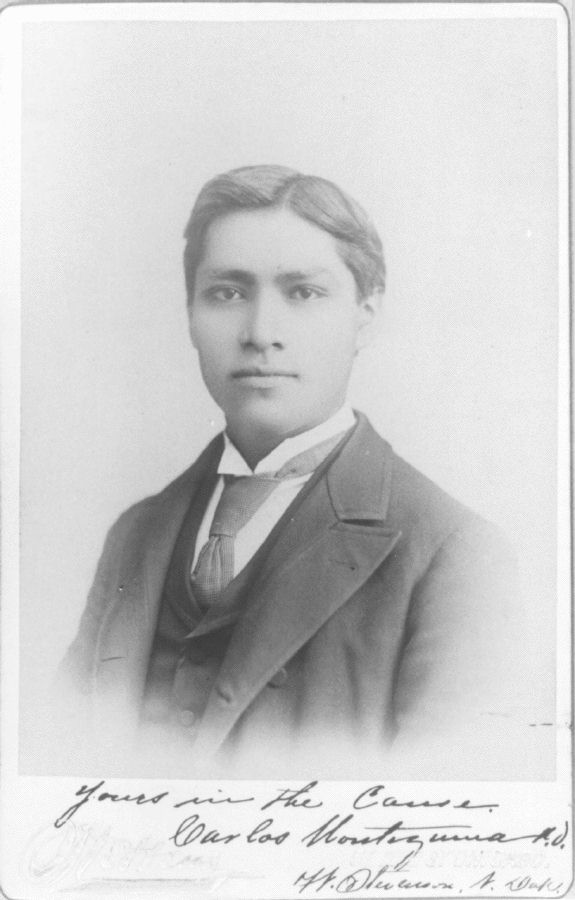Difference between revisions of "Carlos Montezuma and Adoption"
(Created page with "{{#eimage: http://upload.wikimedia.org/wikipedia/commons/8/81/Wassaja.jpg |410x579px|thumb|'''Carlos_Montezuma: A Yavapai activist'''<br />Source: Wikipedia.org.}} ==Biography...") |
m (Admin moved page Carlos Montezuma to Carlos Montezuma and Adoption) |
(No difference)
| |
Revision as of 19:23, 16 June 2014
Biography
The Yavapai boy Wassaja was captured by the Pima people in an 1871 raid but very soon sold on to a white man, Carlos Gentilé, for $30.00. Gentilé named him Carlos Montezuma and adopted him, giving him a loving a happy home. When he was 14, however, he left his father, who was unable to afford to educate the brilliant boy, and fostered by a better-off family.
At 15 he entered the University of Illinois. He graduated from the Chicago Medical College in 1889 and became a reservation doctor in the Indian Service. As a strong advocate of Native American rights (he founded the Society of American Indians), he was sidelined by the Bureau of Indian Affairs. In 1901 he returned to the Yavapai people, found the remnants of his own family, and in 1906 helped them in their legal fight to keep their lands, which were under threat of a government dam on the Verde River in the middle of the Fort McDowell reservation.
Montezuma was the cousin of Hoo-moo-thy-ah.
References
Dever, Maria, and Dever, Aileen. Relative Origins: Famous Foster and Adopted People. (Portland: National Book Company, 1992) Iverson, Peter J. Carlos Montezuma and the Changing World of the American Indians. (Albuquerque: University of New Mexico Press, 1982) ProntoCo. "AZjerome." [Includes portrait]. Available at: [1] Schiavi, Brekah. "Let My People Go." Available at: [2] Craig, Brookie. "We Will Never Forget." Available at: [3] Machula, Paul R. "Hoo-moo-thy-ah; Carlos Montezuma." Available at: [4]
- Adoption Celebrities
- Adopted Persons
- Native American and Alaskan Native, Inuit
- USA
- 19th Century
- 20th Century
- Civil Rights, Advocacy
- Medicine and Allied Professions
- Exile or Persecution (religious, Political or Social)
- School-age Years, Adolescence
- Captured by Another Tribe or Group
- Others ("Strangers")
- Very Poor (Financially) Adoptive or Foster Families
- Trans-Racial, Trans-Tribal, International or Trans-Cultural Adoption or Fostering
- Disrupted or Failed Placements
- Adoptee/Fosteree Traced Family
